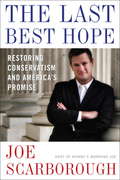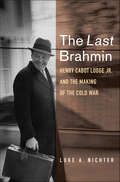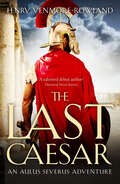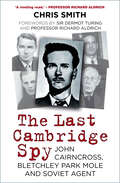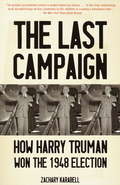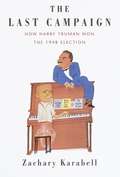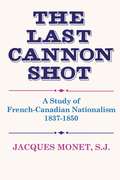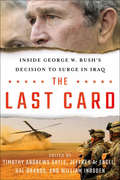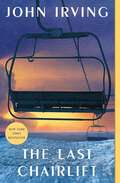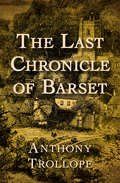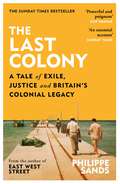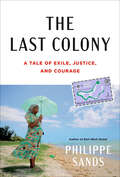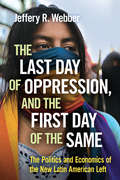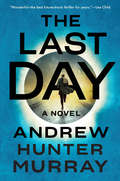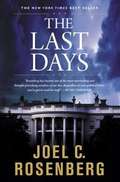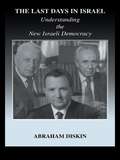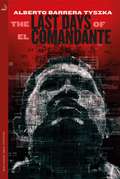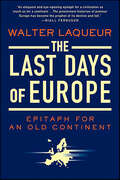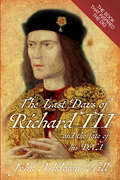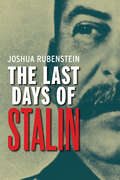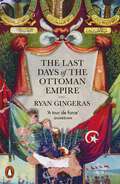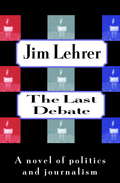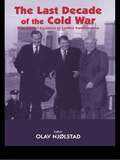- Table View
- List View
The Last Best Hope: Restoring Conservatism and America's Promise
by Joe ScarboroughIn this groundbreaking book, Joe Scarborough tells Republican Party bosses what they don't want to hear, explains why Democrats are making matters so much worse, and then shows leaders of both parties the way forward.
The Last Brahmin: Henry Cabot Lodge Jr. and the Making of the Cold War
by Luke A. NichterThe first biography of a man who was at the center of American foreign policy for a generation Few have ever enjoyed the degree of foreign-policy influence and versatility that Henry Cabot Lodge Jr. did—in the postwar era, perhaps only George Marshall, Henry Kissinger, and James Baker. Lodge, however, had the distinction of wielding that influence under presidents of both parties. For three decades, he was at the center of American foreign policy, serving as advisor to five presidents, from Dwight Eisenhower to Gerald Ford, and as ambassador to the United Nations, Vietnam, West Germany, and the Vatican. Lodge&’s political influence was immense. He was the first person, in 1943, to see Eisenhower as a potential president; he entered Eisenhower in the 1952 New Hampshire primary without the candidate&’s knowledge, crafted his political positions, and managed his campaign. As UN ambassador in the 1950s, Lodge was effectively a second secretary of state. In the 1960s, he was called twice, by John F. Kennedy and by Lyndon Johnson, to serve in the toughest position in the State Department&’s portfolio, as ambassador to Vietnam. In the 1970s, he paved the way for permanent American ties with the Holy See. Over his career, beginning with his arrival in the U.S. Senate at age thirty-four in 1937, when there were just seventeen Republican senators, he did more than anyone else to transform the Republican Party from a regional, isolationist party into the nation&’s dominant force in foreign policy, a position it held from Eisenhower&’s time until the twenty-first century. In this book, historian Luke A. Nichter gives us a compelling narrative of Lodge&’s extraordinary and consequential life. Lodge was among the last of the well‑heeled Eastern Establishment Republicans who put duty over partisanship and saw themselves as the hereditary captains of the American state. Unlike many who reach his position, Lodge took his secrets to the grave—including some that, revealed here for the first time, will force historians to rethink their understanding of America&’s involvement in the Vietnam War.
The Last Caesar (The Aulus Severus Adventures)
by Henry Venmore-RowlandAs Emperor Nero casts his madness over Rome, a loyal soldier is caught in a conspiracy that threatens the empire in this historical epic. Rome, 68 AD: The tyrant emperor Nero has no heir, and whispers of rebellion are spreading fast. As Rome faces the possibility of becoming a republic once more, the ambitions of a few are about to bring untold corruption, chaos, and bloodshed. Aulus Caecina Severus, hero of the campaign against Boudica, has become part of a conspiracy to overthrow Caesar&’s dynasty. But is it really all for the good of Rome? The boundary between service and self-preservation is far from clear, and navigating this dangerous path requires all Severus&’ skills: as a cunning soldier and, increasingly, a deft politician. As the Year of the Four Emperors unfolds, the mighty Roman empire will be plunged into anarchy and civil war . . .
The Last Cambridge Spy: John Cairncross, Bletchley Park Mole and Soviet Agent
by Chris Smith‘A riveting read.’ – Professor Richard Aldrich‘The Last Cambridge Spy is not just a fascinating, well-paced book about an interesting individual, but it also invites us to re-appraise the very idea of the “Cambridge spy ring”.’ – Sir Dermot TuringJohn Cairncross was among the most damaging spies of the twentieth century. A member of the infamous Cambridge Ring of Five, he leaked highly sensitive documents from Bletchley Park, MI6 and the Treasury to the Soviet Union – including the first atomic secrets and raw decrypts from Enigma and Tunny that influenced the outcome of the Battle of Kursk in 1943.In 2014, Cairncross appeared as a secondary, though key, character in the biopic of Alan Turing’s life, The Imitation Game. While the other members of the Cambridge Ring of Five have been the subject of extensive biographical study, Cairncross has largely been overlooked by both academic and popular writers. Despite clear interest, he has remained a mystery – until now.The Last Cambridge Spy is the first ever biography of John Cairncross, using recently released material to tell the story of his life and espionage.
The Last Campaign
by Zachary KarabellIn the presidential campaign of 1948, Americans had a choice across the ideological spectrum, from the far Right to the far Left. This account tells the story of all four candidates' campaigns, and argues that this was the last time a presidential race was dominated by radio and print media, and the last time that progressive and Left points of view were debated and covered in the mainstream press. The author has taught at Harvard, the University of Massachusetts, and Dartmouth. His essays have appeared in newspapers and national publications. Annotation c. Book News, Inc. , Portland, OR (booknews. com)
The Last Campaign: How Harry Truman Won the 1948 Election
by Zachary KarabellThe story of Truman's surprising victory over Thomas E. Dewey.
The Last Cannon Shot: A Study of French-Canadian Nationalism 1837-1850 (The Royal Society of Canada Special Publications)
by Jacques MonetBased on four years of research in the French-Canadian press of the 1840s and the private papers of the main French-Canadian politicians, British officials, and Roman Catholic religious leaders, this book describes in rich and lively detail the conflict of French Canada's priests and politicians around the central issue of their people's relation to the British Crown during that period. Confederation in 1867, modern Canada, and the current tempest in French Canada cannot adequately be understood without constant reference to these men of the 1840s and the political and religious ideologies they represented. Indeed, it was in their enmities, in their friendships and loyalties that were laid the strongbi-national foundations of what Etienne Parent foresaw as 'une grande nationalité canadienne assez forte pour se protéger elle-même et vivre de sa propre vie.'
The Last Card: Inside George W. Bush's Decision to Surge in Iraq
This is the real story of how George W. Bush came to double-down on Iraq in the highest stakes gamble of his entire presidency. Drawing on extensive interviews with nearly thirty senior officials, including President Bush himself, The Last Card offers an unprecedented look into the process by which Bush overruled much of the military leadership and many of his trusted advisors, and authorized the deployment of roughly 30,000 additional troops to the warzone in a bid to save Iraq from collapse in 2007.The adoption of a new counterinsurgency strategy and surge of new troops into Iraq altered the American posture in the Middle East for a decade to come. In The Last Card we have access to the deliberations among the decision-makers on Bush's national security team as they embarked on that course. In their own words, President George W. Bush, Vice President Dick Cheney, National Security Advisor Stephen Hadley, Secretary of State Condoleezza Rice, White House Chief of Staff Joshua Bolten, Secretary of Defense Robert Gates, and others, recount the debates and disputes that informed the process as President Bush weighed the historical lessons of Vietnam against the perceived strategic imperatives in the Middle East. For a president who had earlier vowed never to dictate military strategy to generals, the deliberations in the Oval Office and Situation Room in 2006 constituted a trying and fateful moment.Even a president at war is bound by rules of consensus and limited by the risk of constitutional crisis. What is to be achieved in the warzone must also be possible in Washington, D.C. Bush risked losing public esteem and courted political ruin by refusing to disengage from the costly war in Iraq. The Last Card is a portrait of leadership—firm and daring if flawed—in the Bush White House.The personal perspectives from men and women who served at the White House, Foggy Bottom, the Pentagon, and in Baghdad, are complemented by critical assessments written by leading scholars in the field of international security. Taken together, the candid interviews and probing essays are a first draft of the history of the surge and new chapter in the history of the American presidency.
The Last Chairlift
by John IrvingJohn Irving&’s fifteenth novel is &“powerfully cinematic&” (The Washington Post) and &“eminently readable&” (The Boston Globe). The Last Chairlift is part ghost story, part love story, spanning eight decades of sexual politics.In Aspen, Colorado, in 1941, Rachel Brewster is a slalom skier at the National Downhill and Slalom Championships. Little Ray, as she is called, finishes nowhere near the podium, but she manages to get pregnant. Back home, in New England, Little Ray becomes a ski instructor. Her son, Adam, grows up in a family that defies conventions and evades questions concerning the eventful past. Years later, looking for answers, he will go to Aspen. In the Hotel Jerome, where he was conceived, Adam will meet some ghosts; in The Last Chairlift, they aren&’t the first or last ghosts he sees. John Irving has written some of the most acclaimed books of our time—among them, The World According to Garp and The Cider House Rules. A visionary voice on the subject of sexual tolerance, Irving is a bard of alternative families. In the &“generously intertextual&” (The New York Times) The Last Chairlift, readers will once more be in his thrall.
The Last Chronicle of Barset (The Chronicles of Barsetshire #6)
by Anthony TrollopeA clergyman&’s daughter falls in love with a member of high society while her father stands accused of a terrible crime in this classic Victorian novel. The final installment of the Chronicles of Barsetshire provides a fitting close to the delightful tales author Anthony Trollope developed over the course of six unforgettable and influential novels. When Rev. Josiah Crawley, the perpetual curate of Hogglestock, is accused of stealing a check, the allegation hinders the romantic aspirations of his daughter, Grace, who hopes to marry the archdeacon&’s widowed son, Maj. Henry Grantly. Grace must overcome the objections raised by Grantly&’s family and win their favor while her father stands accused. The final masterwork in a groundbreaking saga that did much to elevate the status of the English novel, The Last Chronicle of Barset is one of the most beloved novels in the Barsetshire treasury, as well as Trollope&’s personal favorite. The author ties together many of the loose threads from the series, turning an attentive eye to some of the Chronicles&’ most beloved—and most loathed—characters. Readers will delight in visiting Barsetshire&’s cathedral and hamlets one last time. This ebook has been professionally proofread to ensure accuracy and readability on all devices.
The Last Clinic: A Darla Cavannah Mystery (Darla Cavannah #1)
by Gary GusickIn a fast-paced, suspenseful debut novel for fans of Harlan Coben and Lisa Gardner, detective Darla Cavannah goes Deep South in pursuit of a merciless killer. Outside the local women's health clinic, the Reverend Jimmy Aldridge waving his protest sign is a familiar sight. But that changes early one morning when someone shoots the beloved Reverend Jimmy dead. Sheriff Shelby Mitchell knows the preacher's murder will shock the good people of Jackson--and the pressure to find the killer is immediate and intense, which is why Shelby calls in detective Darla Cavannah. When police detective Darla moved from Philadelphia to Jackson with her husband--hometown football hero Hugh "the Glue" Cavannah--she never imagined the culture shock that awaited. Then after Hugh dies in a car crash, Darla enters a self-imposed exile in her Mississippi home, taking a leave of absence from the sheriff's department. Now she's called back to duty--or coerced, more like it, with Shelby slathering on his good-ole-boy charm nice and thick, like on a helping of barbecue. Reluctantly partnered with a mulish Elvis impersonator, Darla keeps a cool head even as the community demands an arrest. The court of public opinion has already convicted the clinic's doctor, Stephen Nicoletti, but Darla is just as sure he's not guilty--even as she fights her growing attraction to him. From the genteel suburbs to a raunchy strip club, Darla follows a trail of dirty money and nasty secrets--until the day of judgment comes, and she faces down an ungodly assassin.
The Last Colony: A Tale of Exile, Justice and Britain’s Colonial Legacy
by Philippe SandsFROM THE WINNER OF THE BAILIE GIFFORD PRIZETHE INSTANT SUNDAY TIMES BESTSELLER 'Should be read by anyone who cares about justice, humanity and human rights' Elif Shafak'An essential account' Sunday Times'Powerful and persuasive . . . superb' Abdulrazak Gurnah 'An urgent reminder that Britain's colonial rule isn't our past. It's our present' New Statesman'An important [book]' Observer'Elegant, moving and profoundly informative' The ScotsmanThrough one woman's fight for justice, the award-winning author of East West Street exposes the shocking events that marked the 1965 establishment of the British Indian Ocean Territory. Written with Sands' characteristic expertise, insight and thrilling storytelling, The Last Colony lays bare the brutal legacy of colonial rule, the devastating impact of Britain's grip on its last colony in Africa and the ongoing struggle to right a historic wrong.
The Last Colony: A Tale of Exile, Justice, and Courage
by Philippe SandsThe moving, inspiring David-and-Goliath true story of freedom and justice involving one tiny nation in the Indian Ocean off the coast of Africa, and the extraordinary woman, a descendant of slaves, who dared to take on the Crown and the United Kingdom—and win a historic victoryIn 1973, on the Chagos Islands off the coast of Africa, Liseby Elyse—twenty years old, newly married and four months pregnant—was, rounded up, along with the entire population of Chagos, and ordered to pack her belongings and leave her beloved homeland by ship or slowly starve; the British had cut off all food supplies. Some two thousand people who had lived on the islands of Chagos for generations, many the direct descendants of enslaved people brought there from Mozambique and Madagascar in the 18th century by the French and British, were deported overnight from their island paradise as the result of a secret decision by the British government to provide the United States with land to construct a military base in the Indian Ocean. For four decades the government of Mauritius fought for the return of Chagos. Three decades into the battle, Philippe Sands became the lead lawyer in the case, designing its legal strategy and assembling a team of lawyers from Mauritius, Belgium, India, Ukraine, and the U.S. When the case finally reached the World Court in the Hague, Sands chose as the star witness the diminutive Liseby Elyse, now sixty-five years old, and instructed her to appear before the court, speaking in Kreol, to tell the fourteen international judges her story of forced exile. The fate of Chagos rested on her testimony. The judges faced a landmark decision: Would they rule that Britain illegally detached Chagos from Mauritius? Would Liseby Elyse sway the judges and open the door, allowing her and her fellow Chagossians to return home—or would they remain exiled forever? Philippe Sands writes of his own journey into international law and that of the World Court in the Hague, and of the extraordinary decades-long quest of Liseby Elyse, and the people of Chagos, in their fight for justice and a free and fair return to the idyllic land of their birth.
The Last Day of Oppression, and the First Day of the Same: The Politics and Economics of the New Latin American Left
by Jeffery R. WebberThroughout the 2000s Latin America transformed itself into the leading edge of anti-neoliberal resistance in the world. What is left of the Pink Tide today? What is their relationship to the explosive social movements that propelled them to power? As China's demand slackens for Latin American commodities, will governments continue to rely on natural resource extraction? In an accessible and penetrating volume, Jeffery Webber examines the most important questions facing the Latin American left today.
The Last Day: A Novel
by Andrew Hunter MurrayA visionary and powerful debut thriller set in a terrifyingly plausible dystopian near-future—with clear parallels to today's headlines—in which the future of humanity lies in the hands of one woman, a scientist who has stumbled upon a secret that the government will go to any lengths to keep hidden.A world half in darkness. A secret she must bring to light.It is 2059, and the world has crashed. Forty years ago, a solar catastrophe began to slow the planet's rotation to a stop. Now, one half of the globe is permanently sunlit, the other half trapped in an endless night. The United States has colonized the southern half of Great Britain—lucky enough to find itself in the narrow habitable region left between frozen darkness and scorching sunlight—where both nations have managed to survive the ensuing chaos by isolating themselves from the rest of the world.Ellen Hopper is a scientist living on a frostbitten rig in the cold Atlantic. She wants nothing more to do with her country after its slide into casual violence and brutal authoritarianism. Yet when two government officials arrive, demanding she return to London to see her dying college mentor, she accepts—and begins to unravel a secret that threatens not only the nation's fragile balance, but the future of the whole human race.
The Last Days (Political Thrillers #2)
by Joel C. RosenbergOsama bin Laden is dead. Saddam's regime is buried. Baghdad lies in ruins. Now the eyes of the world are on Jon Bennett and Erin McCoy, two senior White House advisors, as they arrive in the Middle East to offer a historic Arab-Israeli peace plan and the American president's new vision of freedom and democracy. But in the shadows lie men whose hearts are filled with evil-men for whom the prospects of peace go against everything they believe. And soon, one terrifying scheme after another begins to unfold: An Iranian plot to send suicide bombers into the U.S. A terrorist plot to assassinate the prime minister of Israel A Jewish plot to blow up the Dome of the Rock As Jon and Erin face a battle for control of Jerusalem, a battle for control of the Holy Land, and an Iraqi plan to rebuild ancient Babylon, they can't help but wonder: Are such signs evidence that they are living in the last days before the return of Christ? "THE LAST DAYS IS A... RIP-ROARING, HEART-POUNDING, PAGE-TURNING,HIGH-OCTANE GEOPOLITICAL THRILLER."
The Last Days in Israel: Understanding the New Israeli Democracy (Israeli History, Politics and Society #No. 26)
by Abraham DiskinDuring the 1990s many dramatic changes influenced the basic characteristics of the Israeli democracy. This volume examines the challenges and circumstances the country has faced and addresses both the public's and leadership's singular goal of "peace and security". The book also investigates the renewed constitutional framework which attempted to meet new challenges, but in reality contributed to the evolution of "new politics" and a new party system. This new system is explored through an analytical study of the history of the party system with an emphasis on new phenomena, such as the growing fragmentation of recent years. Developments since the early 1990s are also examined, looking at the governmental periods of Prime Ministers: Shamir, Rabin, Peres, Netanyahu and Barak.
The Last Days of America
by Paul Emil ErdmanAt the centre of this breathlessly paced story is Frank Rogers, President of a California aerospace company, who makes a last minute dash to Europe to secure a multibillion missile program and finds himself dealing with a twenty million dollar slush fund, a bribery plot involving a Swiss lawyer who plays both ends against the middle, several NATO generals, a Chancellor of Germany and his own chairman of the board. Very soon, Rogers is on the run, a man on everybody's "wanted" list, whose ambition is to reach a country from which he can't be extradited, while his flight sets off a chain of circumstances that can bring to an end the last days of America's position as a major world power.
The Last Days of El Comandante (Latin American Literature In Translation Ser.)
by Alberto Barrera TyszkaVenezuela 2012: The President's illness casts a shadow over the lives of his citizens - he divides opinion, but life without him is almost unimaginable. Miguel Sanabria is a retired oncologist, ambivalent towards the President but caught between a virulently anti-Chávez wife and a equally vehement pro-Chávez brother. He is asked by his nephew to hide a mobile phone carrying secret footage that could shed new light on the President's condition.His neighbour Fredy has found a fresh angle for a new book about Chávez, but to take advantage he must agree to a "green-card" marriage and leave his girlfriend and their son for two months, even as their landlady plots to repossess their home.In another apartment live nine-year-old María and her neurotic, near-agoraphobic mother. Taken out of school to be educated at home, María turns to internet chat rooms for company, while her mother's fears about the city's endemic violence are proved tragically prescient.The fates and fortunes of these neighbours will prove inextricably entwined as the hour of the President's death draws ever closer.REVIEWS FOR THE SICKNESS"A great book" Michael Morpurgo"Powerful themes and powerful writing" Susan HillTranslated from the Spanish by Rosalind Harvey
The Last Days of Europe: Epitaph for an Old Continent
by Walter Laqueur• In Brussels in 2004, more than 55 percent of the children born were of immigrant parents • Half of all female scientists in Germany are childless• According to a poll in 2005, more than 40 percent of British Muslims said Jews were a legitimate target for terrorist attacks What happens when a falling birthrate collides with uncontrolled immigration? The Last Days of Europe explores how a massive influx from Asia, Africa, and the Middle East has loaded Europe with a burgeoning population of immigrants, many of whom have no wish to be integrated into European societies but make full use of the host nations' generous free social services. One of the master historians of twentieth-century Europe, Walter Laqueur is renowned for his "gold standard" studies of fascism, terrorism, and anti-Semitism. Here he describes how unplanned immigration policies and indifference coinciding with internal political and social crises have led to a continent-wide identity crisis. "Self-ghettoization" by immigrant groups has caused serious social and political divisions and intense resentment and xenophobia among native Europeans. Worse, widespread educational failure resulting in massive youth unemployment and religious or ideological disdain for the host country have bred extremist violence, as seen in the London and Madrid bombings and the Paris riots. Laqueur urges European policy makers to maintain strict controls with regard to the abuse of democratic freedoms by preachers of hate and to promote education, productive work, and integration among the new immigrants. Written with deep concern and cool analysis by a European-born historian with a gift for explaining complex subjects, this lucid, unflinching analysis will be a must-read for anyone interested in international politics and the so-called clash of civilizations.
The Last Days of Richard III and the fate of his DNA: The Book that Inspired the Dig
by John Ashdown-HillThe Last Days of Richard III contains a new and uniquely detailed exploration of Richard’s last 150 days. By deliberately avoiding the hindsight knowledge that he will lose the Battle of Bosworth Field, we discover a new Richard: no passive victim, awaiting defeat and death, but a king actively pursuing his own agenda.It also re-examines the aftermath of Bosworth: the treatment of Richard’s body; his burial; and the construction of his tomb. And there is the fascinating story of why, and how, Richard III’s family tree was traced until a relative was found, alive and well, in Canada.Now, with the discovery of Richard’s skeleton at the Greyfrairs Priory in Leicester, England, John Ashdown-Hill explains how his book inspired the dig and completes Richard III’s fascinating story, giving details of how Richard died, and how the DNA link to a living relative of the king allowed the royal body to be identified.
The Last Days of Stalin
by Joshua RubensteinA gripping account of the months before and after Joseph Stalin’s death and how his demise reshaped the course of twentieth-century history.Joshua Rubenstein’s riveting account takes us back to the second half of 1952 when no one could foresee an end to Joseph Stalin’s murderous regime. He was poised to challenge the newly elected U.S. President Dwight Eisenhower with armed force, and was also broadening a vicious campaign against Soviet Jews. Stalin’s sudden collapse and death in March 1953 was as dramatic and mysterious as his life. It is no overstatement to say that his passing marked a major turning point in the twentieth century.The Last Days of Stalin is an engaging, briskly told account of the dictator’s final active months, the vigil at his deathbed, and the unfolding of Soviet and international events in the months after his death. Rubenstein throws fresh light onthe devious plotting of Beria, Malenkov, Khrushchev, and other “comrades in arms” who well understood the significance of the dictator’s impending death;the witness-documented events of his death as compared to official published versions;Stalin’s rumored plans to forcibly exile Soviet Jews;the responses of Eisenhower and Secretary of State Dulles to the Kremlin’s conciliatory gestures after Stalin’s death; andthe momentous repercussions when Stalin’s regime of terror was cut short.“A fascinating and often chilling reconstruction of the months surrounding the Soviet dictator’s death.” —Saul David, Evening Standard (UK)“A gripping look at the power struggles after the Red Tsar’s death.” —Victor Sebestyen, The Sunday Times (UK)“Stalin’s death in March 1953 cut short another spasm of blood purges he was planning, but triggered only limited Soviet reforms. To some Westerners it promised an extended period of peace, but others feared it would leave the West even more vulnerable. Joshua Rubenstein’s lively, detailed, carefully crafted book chronicles a key twentieth-century turning point that didn’t entirely turn, revealing what difference Stalin’s death did and didn’t make and why.” —William Taubman, author of Khrushchev: The Man and His Era
The Last Days of the Ottoman Empire
by Ryan Gingeras'A tour de force of accessible scholarship' The Guardian'Impressive ... It is a complicated story that still reverberates, and Gingeras narrates it with lucid authority' New StatesmanThe Ottoman Empire had been one of the major facts in European history since the Middle Ages. Stretching from the Adriatic to the Indian Ocean, the Empire was both a great political entity and a religious one, with the Sultan ruling over the Holy Sites and, as Caliph, the successor to Mohammed.Yet the Empire's fateful decision to support Germany and Austria-Hungary in 1914 doomed it to disaster, breaking it up into a series of European colonies and what emerged as an independent Saudi Arabia.Ryan Gingeras's superb new book explains how these epochal events came about and shows how much we still live in the shadow of decisions taken so long ago. Would all of the Empire fall to marauding Allied armies, or could something be saved? In such an ethnically and religiously entangled region, what would be the price paid to create a cohesive and independent new state? The story of the creation of modern Turkey is an extraordinary, bitter epic, brilliantly told here.
The Last Debate
by Jim Lehrersharp satire of the presidential debate that changes the course of electoral politics (and the news business) forever--by Jim Lehrer, who has been a moderator of past presidential debates. The targets of this satire--religious fundamentalists, political handlers, self-important journalists, feral network programming heads--could not be more timely.
The Last Decade of the Cold War: From Conflict Escalation to Conflict Transformation (Cold War History)
by Olav NjølstadThe 1980s was a period of almost unprecedented rivalry and tension between the two main actors in the East-West conflict, the United States and the Soviet Union. Why and how that conflict first escalated and thereafter, in an amazingly swift process, was reversed and brought to its peaceful conclusion at the end of the decade is the topic of this volume.With individual contributions by eighteen well-known scholars of international relations and history from various countries, the book addresses the role of the United States, the former Soviet Union, and the countries of western and eastern Europe in that remarkable last decade of the Cold War, and discusses how particular events as well as underlying political, ideological, social, and economic factors may have contributed to the remarkable transformation that took place.
